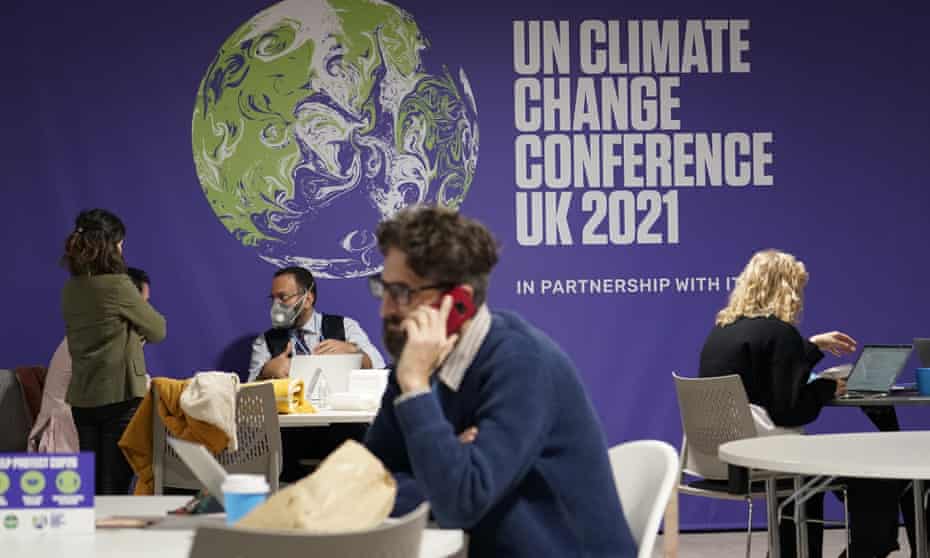Few changes as Cop26 draft text homes in on make-or-break issues
Analysis: Fossil fuel phaseout stays in but promise of funds for climate change damage may not be enough to sway poorer nations

The new Cop26 draft text released on Saturday morning has relatively few changes, showing that the global climate summit is narrowing down on the most contested issues that will make or break a strong agreement.
The call for the phaseout of coal and fossil fuel subsidies remains, which is positive as many observers thought fossil fuel-rich nations would get it deleted.
It has been slightly softened again, with “accelerating efforts towards” inserted before “coal phaseout”, rather than a straight call for a phaseout. That may be the price of keeping the clause in – no Cop document has ever named fossil fuels.
Also added to this section is “recognising the need for support towards a just transition”, highlighting that funds may be needed to retrain fossil fuel industry workers.
The all-important “ratchet” remains, asking nations to return to the next Cop in 2022 with more ambitious pledges to cut emissions. The current ones to 2030 are forecast to lead to a catastrophic 2.4C of global heating.
The most substantial changes are on “loss and damage” – the compensation vulnerable and poor countries want for the destruction already being caused by the climate crisis they did little to cause. It is perhaps the most bitterly fought section of all, with low-income nations believing they have a moral right to this money and rich nations such as the US and EU fearing exposure to unlimited financial liabilities.
The new text introduces a specific mention of “funds”:
Decides that the Santiago network will be provided with funds to support technical assistance for the implementation of relevant approaches to avert, minimise and address loss and damage
The previous text said “will be supported by a technical assistance facility to provide financial assistance”. It’s a small change, but a group of 130 nations, called the G77 + China and representing 85% of the world’s population, have been demanding the inclusion of text to establish a “loss and damage facility”, a specific delivery mechanism for funding, rather than more vague words about assistance in setting something up.
The text also says:
Decides to establish the [NAME] dialogue between parties, relevant organisations and stakeholders to discuss the arrangements for the funding of activities to avert, minimise and address loss and damage associated with the adverse impacts of climate change to take place at the first sessional period of the SBI, concluding at its 60th session
This gives a specific timetable for dedicated work on loss and damage. These are concessions from rich nations, but it may not be enough. The G77 + China have been clear that loss and damage is a critical issue for them.
Saleemul Huq, a veteran from Bangladesh of every Cop, tweeted that the language on loss and damage had “gone backwards” from the previous day’s text, while Mohamed Adow of the thinktank Power Shift Africa said vulnerable countries “can’t afford to leave Cop26 with this current version of the text on loss and damage”.
There has also been a little movement on funding for adaptation – preparing for climate impacts like floods and droughts. The new text specifies the date – 2019 – from which the money must be doubled by 2025. That implies about $40bn a year.
There are also highly complex negotiations taking place over issues including the rules to ensure that carbon trading markets do not have loopholes. However, Panama’s delegate is furious about the current state of these talks.
The new text on markets at @COP26 is a disgrace. Yes to CDM credits from 2013 but no to REDD+ in any way shape or form? Mr. President @AlokSharma_RDG: No way, No how, NO DEAL. #COP26 #Article6 #StopFailingUs #ClimateCrisis
— Juan Carlos Monterrey (@juanmonterreyg)
Tracy Carty, the head of Oxfam’s Cop26 delegation, said: “Here in Glasgow, the world’s poorest countries are in danger of being lost from view, but the next few hours can and must change the course we are on.
“What’s on the table is still not good enough. We need decisive progress on finance to help countries adapt and for the loss and damage endured. It is of deep concern that developing countries’ proposal for a loss-and-damage finance facility has not been included in this new draft. Negotiators should come back to the table armed with cans of Irn-Bru and stop at nothing to get an ambitious deal over the line.”
